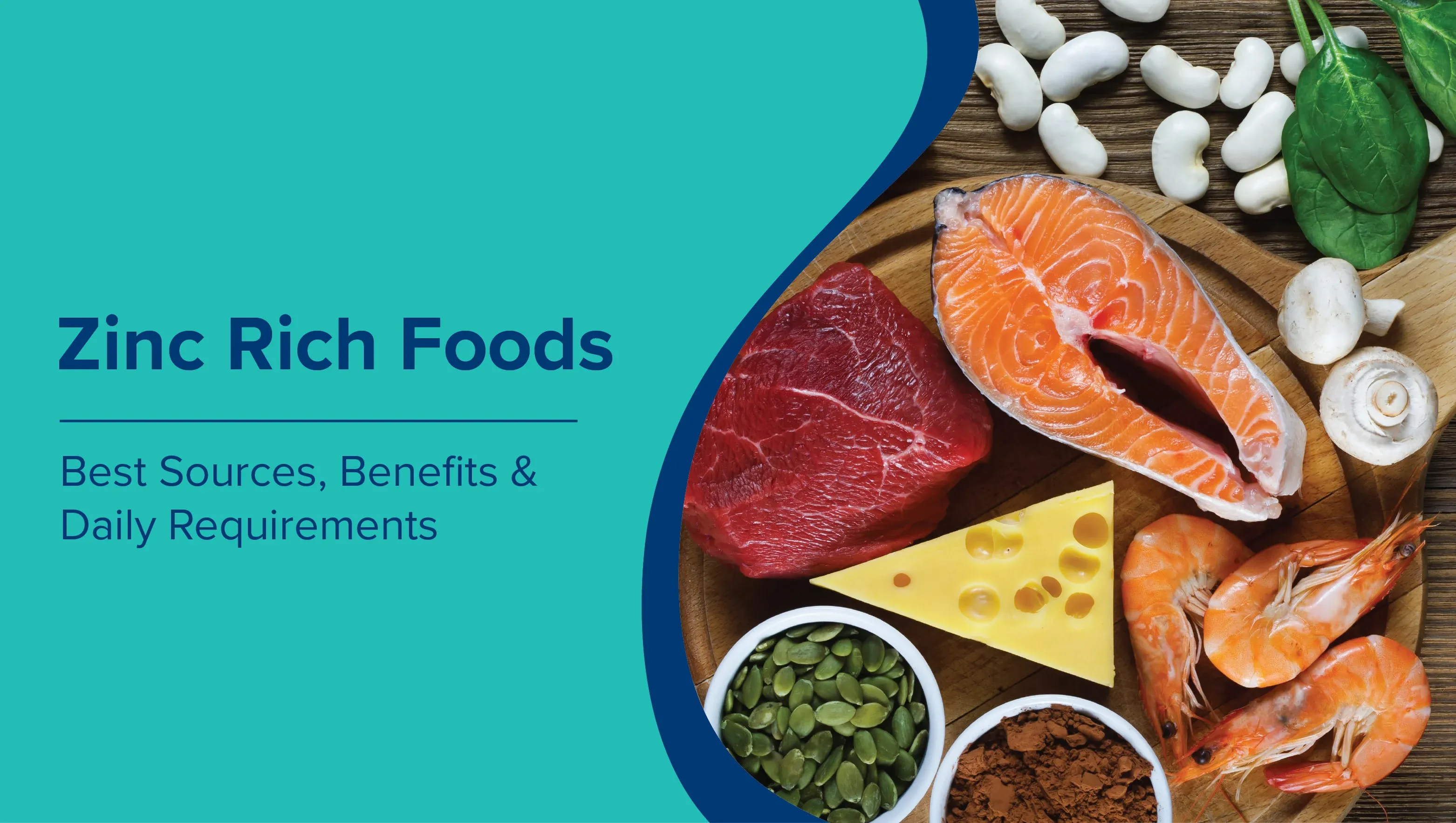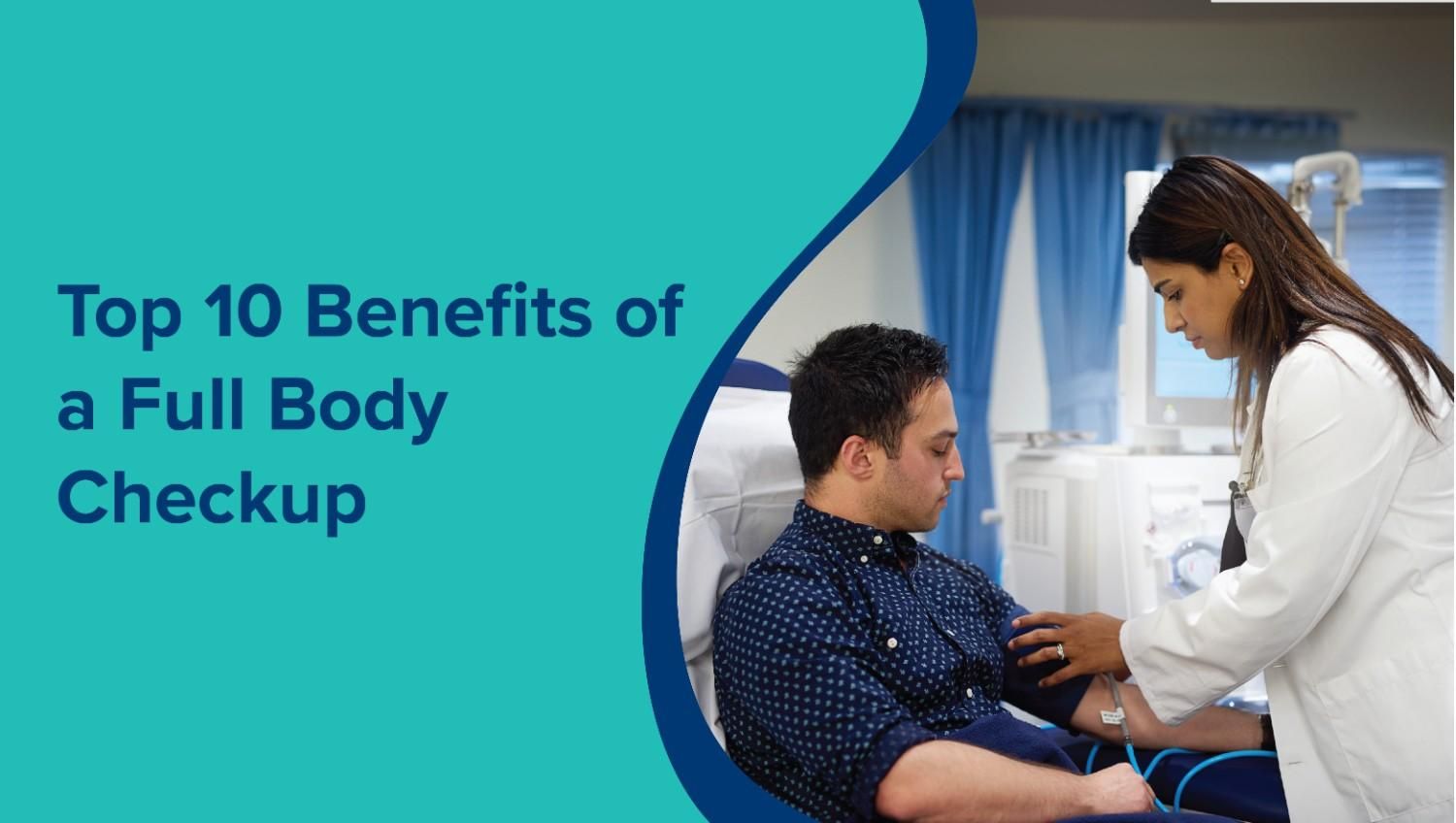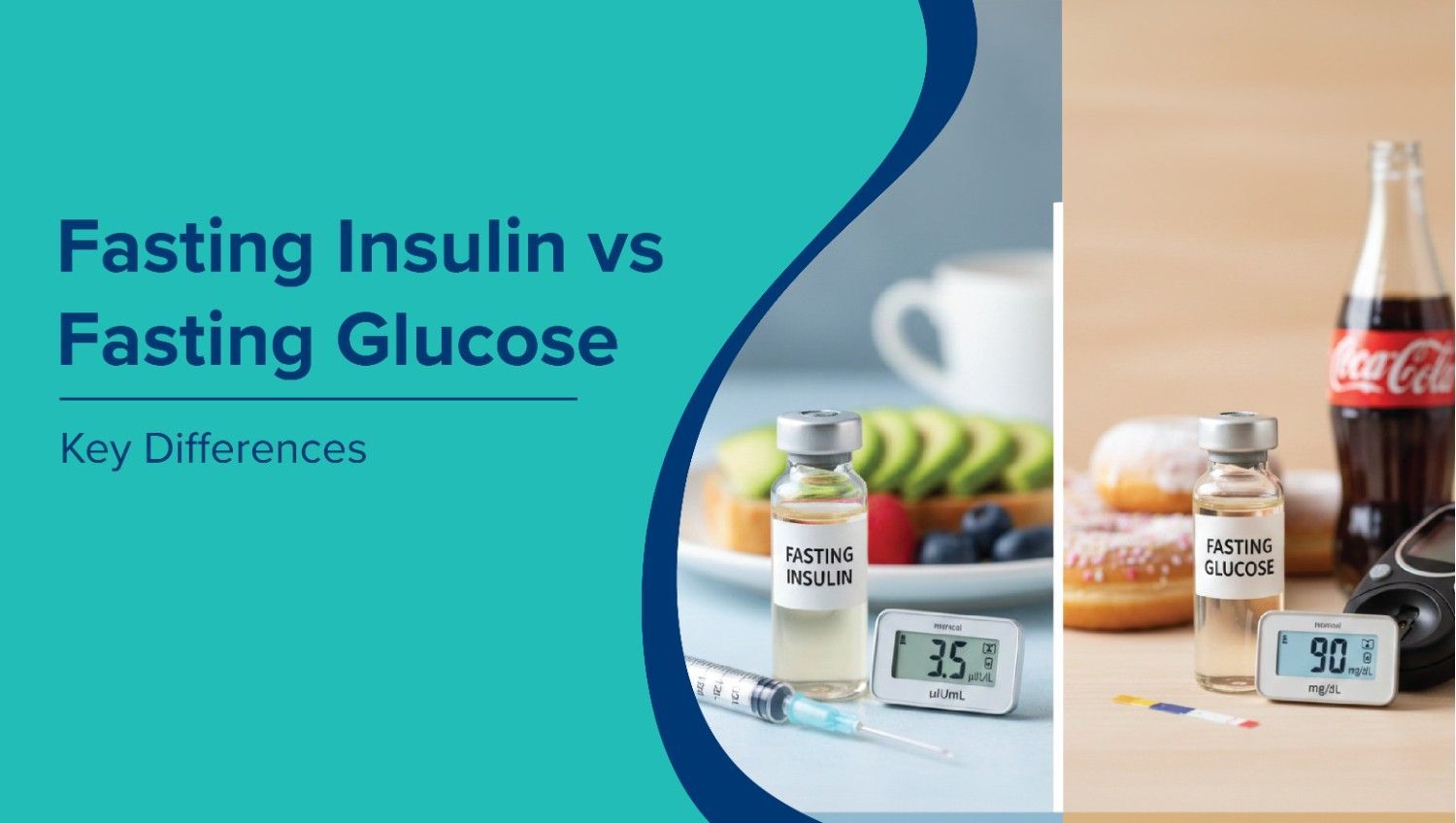Zinc is an essential mineral that the body needs in small amounts to carry out many important functions. Despite its importance, it is often overlooked in everyday diets, leading to deficiencies that can affect overall health. As zinc cannot be produced or stored by the body, it must be consumed regularly through food. To help maintain optimal zinc levels, this article will discuss how much zinc the body needs, the best zinc rich foods (including vegetarian, non-vegetarian, fruits, and vegetables), and practical tips to increase zinc naturally. But first, let’s understand the role of zinc in the human body.
What is Zinc and Why Does the Body Need It?
Zinc is a trace mineral that plays a structural and functional role in hundreds of enzymes and proteins within the body. It helps regulate cell division, DNA synthesis, and protein formation, which are fundamental for growth and repair. Since zinc is not stored in large amounts, a steady dietary intake is essential.
It is particularly important during life stages such as childhood, adolescence, and pregnancy, when growth and development are at their peak. Adequate zinc also contributes to neurological health, metabolic activity, and recovery from illness. In children with developmental concerns, services such as Speech Therapy at Home can provide additional support alongside proper nutrition.
In situations where individuals need close dietary monitoring, especially after a severe infection or surgery, professional support like Nursing Care can ensure zinc requirements are met effectively.
Benefits of Zinc for the Body
The impact of zinc is best seen in the way it supports everyday health and prevents illness. Adequate zinc intake can:
-
Reduce infections by strengthening immune defences.
-
Promote faster healing of wounds, burns, and post-surgical recovery.
-
Support skin health, managing acne, rashes, and inflammation.
-
Strengthen hair and nails, preventing thinning and brittleness.
-
Maintain reproductive health, aiding foetal growth in pregnancy and sperm production in men.
-
Boost brain function by enhancing learning and memory in children.
-
Lower lifestyle risks, including blood pressure and metabolic concerns (Ambulatory Blood Pressure Monitoring)
Daily Requirement of Zinc in Human Body
The amount of zinc needed each day depends on age, gender, and life stage. Meeting this requirement through diet is important, as both deficiency and excess can affect health.Here are the recommended daily zinc requirements for different age groups, genders, and special conditions:
-
Men: about 11 mg per day
-
Women: about 8 mg per day
-
Pregnant women: about 11-12 mg per day
-
Breastfeeding women: about 12 mg per day
-
Children (4-8 years): about 5 mg per day
-
Children (9-13 years): about 8 mg per day
-
Adolescents (14-18 years): 9-11 mg per day
These values are based on international nutrition guidelines and may vary slightly depending on dietary patterns. Regular intake of zinc foods is the safest way to meet these needs naturally without relying solely on supplements.
Zinc Deficiency: Symptoms and Risk Factors
Low zinc levels can affect many functions in the body, often showing up through subtle signs before progressing into more serious health issues. Recognising these symptoms early can help in timely correction through diet or supplements. Common symptoms of zinc deficiency include:
-
Frequent colds, infections, or delayed healing of wounds
-
Loss of appetite and unintended weight loss
-
Hair thinning and brittle nails
-
Skin problems such as acne, rashes, or dryness
-
Poor sense of taste or smell
-
Delayed growth and development in children
Risk Factors for Zinc Deficiency:
-
Pregnant and breastfeeding women due to higher nutritional needs
-
Vegetarians and vegans, since plant-based zinc is less easily absorbed
-
Older adults with reduced appetite or absorption issues
-
People with chronic illnesses or digestive conditions that affect nutrient absorption
When left unaddressed, zinc deficiency can weaken immunity, delay recovery, and affect overall quality of life. In such cases, dietary monitoring and professional guidance, such as Female Nurse for 12/24 Hour Homecare
Zinc Rich Foods and Their Sources
Zinc can be obtained from a wide range of foods, making it possible to meet daily needs through a balanced diet. Both animal-based and vegetarian options contribute to zinc intake, along with certain fruits and vegetables.
Animal-based sources of zinc
-
Oysters, crab, and other shellfish are among the richest sources.
-
Red meat such as beef and lamb, along with poultry, provide easily absorbable zinc.
-
Eggs and dairy products contribute smaller but consistent amounts.
Vegetarian sources of zinc
-
Legumes such as chickpeas, lentils, and beans are reliable plant-based options.
-
Whole grains like oats, brown rice, and quinoa provide moderate amounts.
-
Nuts and seeds, especially pumpkin, sesame, and cashews, are among the best vegetarian zinc foods.
-
Fortified cereals and dairy alternatives can also help meet requirements for those on vegan diets.
Fruits and vegetables with zinc
-
Fruits such as guava, pomegranate, and avocado provide smaller amounts of zinc.
-
Vegetables including mushrooms, spinach, peas, and asparagus add to daily intake.
Including a mix of these foods in regular meals ensures adequate zinc levels while also delivering other vital nutrients.
Zinc Foods Chart with Nutritional Values
A variety of everyday foods provide zinc in different amounts. The table below shows the approximate zinc content in commonly consumed items (per 100 g). Values may vary slightly depending on preparation and source.
|
Food Item |
Zinc Content (mg/100g) |
|
Oysters (cooked) |
16-25 mg |
|
Crab (cooked) |
6-7 mg |
|
Red meat (beef/lamb) |
4-5 mg |
|
Chicken (cooked) |
1-2 mg |
|
Eggs |
1.3 mg |
|
Milk & dairy products |
0.5-1 mg |
|
Pumpkin seeds |
7-8 mg |
|
Sesame seeds |
7-10 mg |
|
Cashew nuts |
5-6 mg |
|
Chickpeas (cooked) |
1-2 mg |
|
Lentils (cooked) |
1-1.3 mg |
|
Spinach (cooked) |
0.5-0.7 mg |
|
Mushrooms |
0.6-0.8 mg |
|
Guava |
0.2-0.3 mg |
|
Pomegranate |
0.3 mg |
Zinc Rich Foods for Specific Needs
Certain groups have higher nutritional demands, and choosing the right zinc foods can make a significant difference in their health and well-being.
For Babies and Toddlers
Breast milk is the best source of zinc during the first months of life. As children grow, mashed pulses, lentils, fortified cereals, and small portions of dairy help meet their daily needs. Adequate zinc level also supports growth, immunity, and brain development. In cases of delayed milestones or speech issues, services such as Speech Therapy at Homecan provide added support.
For Skin Health
Zinc aids in tissue repair and helps manage acne, rashes, and inflammation. Foods such as nuts, seeds, spinach, and whole grains are rich in zinc and beneficial for healthy, glowing skin.
For Hair Growth
Regular intake of zinc from sources like chickpeas, pumpkin seeds, and cashews helps strengthen hair follicles, reducing hair thinning and breakage.
For Pregnancy and Immunity
Pregnant women require higher amounts of zinc to support foetal development. Whole grains, dairy, lean meats, and legumes are excellent choices. In cases where dietary intake is insufficient, supervision from a Female Nurse for 12/24 Hour Homecare may ensure proper nutrition.
How to Increase Zinc in Body Naturally
Meeting daily zinc needs is best achieved through diet rather than supplements, unless prescribed by a doctor. Making small but consistent changes to everyday meals can help maintain healthy zinc levels.
-
Add zinc-rich snacks such as roasted pumpkin seeds, cashews, or chickpeas.
-
Include protein sources daily, such as meat, poultry, fish, or legumes for vegetarians.
-
Pair with vitamin C-rich foods like citrus fruits and tomatoes to improve absorption.
-
Choose whole grains over refined options, as they retain more nutrients including zinc.
-
Limit excessive tea, coffee, and processed foods, which may hinder zinc absorption.
A balanced diet with a variety of zinc food sources ensures the body gets the required amount naturally, without the need for heavy supplementation.
When to Consider a Zinc Level (Serum Zinc) Test
A zinc test may be helpful when deficiency is suspected or risk is higher. It is commonly recommended for:
-
Persistent signs suggestive of low zinc (as outlined in the deficiency section).
-
High-risk groups such as pregnant or breastfeeding women, infants, older adults, and those on long-term vegetarian/vegan diets.
-
Chronic diarrhoea, malabsorption syndromes, or gastrointestinal surgeries.
-
Poor wound healing or recurrent infections despite adequate nutrition.
-
Long-term use of medications that may affect zinc status (for example, certain diuretics).
How is the Zinc Test Done at Home with MaxAtHome?
A zinc level test (serum zinc) is a simple blood test that checks zinc concentration in the body. With MaxAtHome, the process is quick, safe, and convenient. A trained phlebotomist visits the home to collect a small blood sample from a vein, which is then analysed in NABL-accredited labs. Results are delivered digitally within 24-48 hours, depending on location.
To ensure accuracy:
-
Follow fasting instructions if advised, as some labs prefer a morning sample.
-
Avoid taking zinc supplements for 24-48 hours before testing, unless prescribed.
-
Inform the professional about ongoing medicines or recent vitamin/mineral use.
-
Stay well hydrated and wear clothing that allows easy access to the arm for collection.
This simple process ensures accurate results without the need to visit a clinic, making zinc testing easier and more accessible for families across India.
Book a Zinc Test at Home Today!
Checking zinc levels can guide diet and treatment decisions, especially for those at higher risk or with persistent deficiency features. To book a test at home, call 9240299624 or schedule the test online through our easy-to-use booking platform.
Frequently Asked Questions (FAQs)
What foods are high in zinc?
Foods high in zinc include oysters, crab, red meat, chicken, eggs, dairy products, legumes, pumpkin seeds, sesame seeds, cashews, spinach, and mushrooms. Including a mix of animal-based and vegetarian zinc food sources helps meet daily needs.
Is banana a source of zinc?
Bananas contain only a very small amount of zinc and are not considered a rich source. Other fruits such as guava, pomegranate, and avocado provide more zinc compared to bananas.
Which food has more zinc: seeds or nuts?
Seeds such as pumpkin and sesame generally contain more zinc per serving than nuts. However, nuts like cashews and almonds are also good sources and make a convenient zinc-rich snack.
Can I get enough zinc from vegetarian sources?
Yes. Vegetarian zinc foods such as legumes, whole grains, dairy, nuts, and seeds can provide sufficient amounts if included daily. Pairing these with vitamin C-rich foods can further improve absorption.
How much zinc do I need daily?
The daily requirement varies: men need about 11 mg, women 8 mg, pregnant women 11-12 mg, and children 5-8 mg depending on age. These needs are best met through foods that contain zinc.
Why are zinc-rich foods important for kids?
Zinc foods for babies and children support growth, strengthen immunity, and help with brain development. Options include fortified cereals, lentils, beans, dairy, and small servings of eggs.
How do zinc-rich foods boost immunity in kids?
Zinc plays a role in producing immune cells and fighting infections. Regular intake of zinc-rich foods for children reduces the frequency of colds and supports healthy growth.
How can I increase zinc naturally without supplements?
Zinc levels can be increased by adding zinc foods such as chickpeas, cashews, pumpkin seeds, seafood, eggs, and spinach to everyday meals. Choosing whole grains and limiting processed foods also helps.
Do eggs contain zinc?
Yes, eggs provide zinc in moderate amounts, about 1.3 mg per 100 g. While not the highest source, they are a valuable addition to a balanced zinc-rich diet.
Which fruits and vegetables are rich in zinc?
Guava, pomegranate, avocado, peas, spinach, mushrooms, and asparagus are among the best zinc-rich fruits and vegetables to include in the diet.
Where can I book a zinc test near me?
A zinc test, also known as a serum zinc test, can be easily booked through home collection services. With MaxAtHome, trained professionals collect the sample at home, the test is processed in NABL-accredited labs, and detailed digital reports are delivered quickly.















